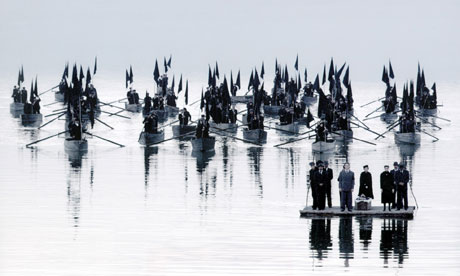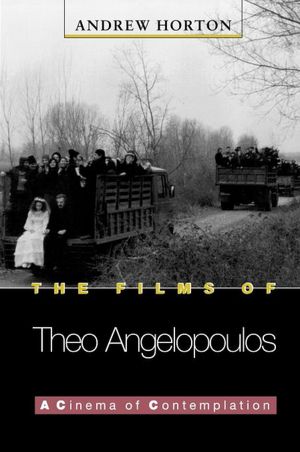by Andrew Horton
Greek Cinema and Films About Greece

FADE IN on an old political refugee Spyros (the late Manos Katrakis) returning to his Northern Greek village after so many years of exile in the Soviet Union in Theo Angelopoulos’s Voyage to Cythera (1983) When he is near his old home, he begins chirping in what sounds like “bird talk” and soon his call is answered by what appears to be another “bird” speaking. Soon we see another old man appear and suddenly two long parted friends are united because of their “secret” language they used during the Occupation and the Civil War in Greece that followed. This surprisingly joyous moment is followed by Spyros performing a “Pontiko” dance on the grave of another friend in the village cemetery. This dance on the grave clearly strikes all viewers as a kind of triumph over death, destruction, war, exile and separation. In short, the moment is like a New Orleans “jazz funeral”: a celebration of life after death through dance and festivity.
No one would accuse Theo Angelopoulos of being a Greek Frank Capra, Jerry Lewis, Charlie Chaplin or James Carey or even a Hellenic Jacques Tati. And yet if we embrace a larger world of the “comic spirit” as it has existed through centuries of literature, song and culture in Greece and the Balkans, one can surely identify both “comic” and “humorous” as well as ironic moments throughout the many journeys Angelopoulos’s protagonists embark upon. From Suspended Step of the Stork, Ulysses’ Gaze and Voyage to Cythera to Eternity and a Day and even Traveling Players, I wish to comment on how thematically and in terms of narrative, these “comic moments” contribute to the atmosphere and overall impression these films leave us with. On a personal note, I would add that after having known Theo for more than twenty five years and written two books and many essays on his work, it is this spirit of “tragic comedy” or dark triumph that appears to be an important and reoccurring theme in his career.
My overall approach builds not only on my studies of Angelopoulos’s films, but also on my comic research in my books, COMEDY/ CINEMA/THEORY and LAUGHING OUT LOUD: WRITING THE COMEDY CENTERED SCREENPLAY (both with U of California Press). And my major point is that “comedy” is a much wider world than just jokes, laughter, slapstick. Take Dante’s DIVINE COMEDY, for instance. In the largest sense, comedy is about “triumph” in some form, thus Dante’s “comedy” was the triumph of reaching Paradise . Humor and laughter are one part of comedy, but only a part, and so I am stressing as in the opening example of Spyros’s return to his old village, a sense of personal triumph over all adversity. I wish also to see Angelopoulos’s both dark and joyous sense of the comic within a tradition that can be seen throughout the work of other Balkan filmmakers.
It is important also for this consideration of Angelopoulos’s films to remember one of the points made in Plato’s Symposium near the ending when Socrates and Aristophanes are the only remaining guests and they remark on how often comedy and tragedy cross lines into each other (Horton,Comedy/ Cinema/ Theory 3). After all, both tragedy and comedy began as ritual celebrations of Dionysos, the god of wine and drama. Furthermore, such an extended view of comedy which embraces its possible border crossing into the tragic as well helps us to appreciate George McFadden’s remark that, “The great works of comic writing (and we can add film) have extended the range of our feelings” (243).
Before exploring such dark and joyful laughter, however, a note is offered on what we mean by “Balkan”. Dina Iordinova best captures the concept as used here when she notes, “In my usage, the Balkans is not a geographical concept but one that denotes a cultural entity, widely defined by shared Byzantine, Ottoman and Austro-Hungarian legacies and by the specific marginal positioning of the region in relation to the western part of the European continent” (6). We are speaking, therefore, of cinemas from the former Yugoslavia , Bulgaria , Albania , Greece , Turkey and Rumania most specifically, even when, as Iordinova readily recognizes, these countries themselves often resist the label of “Balkan”.
I would add more specifically that what these Balkan histories represent are complicated but also fertile crossings of Christian Orthodox cultures with Muslim influences from the roughly 500 years of Turkish domination. In terms of “tragic comedy” as a concept, therefore, it is important to note that we should acknowledge the larger view of “comedy” as meaning a triumph that could be spiritual rather than physical or humorous. This sense of “comic triumph” in a spiritual vein has existed in the cultures of the Balkans and especially the former Yugoslavia . The epic poems of Serbia , for instance, celebrate the Serbian spiritual victory over the conquering Turks during the Battle of Kosovo in the 14th century. The Turks, such poems declare, only murdered and destroyed Serbs as living creatures, not as Christians and spiritual beings.
Equally important to the humor and sense of comedy of these cultures, however, is a very strong sense of irony. We know that irony thrives on drawing attention between what could or might be and what in fact is actually reality. As practiced by Balkan filmmakers, irony often calls forth both tears and laughter as we “get” the difference between ideals and harsh realities, dreams and history.
Of course such a blend of humor and horror is not limited to the Balkans as Roberto ‘Benigni’s Life Is Beautiful (1997) suggests in the tragic irony of its title and ending as the young boy sees an American tank and thinks he has “won” the contest his father (Benigni) has tried to pretend the concentration camp during WWII is instead of a death camp.
The much celebrated director Emir Kusturica’s Time of the Gypsies provides us with a clear example of such dark yet comic irony. Based on newspaper reportage of actual Yugoslav gypsies who not only worked in crime organizations throughout Italy but who also sold their own children into slavery, prostitution and crime, the film tracks one young boy’s odyssey from Yugoslavia to Italy in a Godfather-like tale (there are, in fact, many direct references to Copolla's crime trilogy). As Kusturica’s film ends, the young gypsy Mafia protagonist is murdered and at the funeral his five year old son steals the coins placed over his father’s eyes (an ancient custom) and runs out of the house. We can’t help but laugh at the son stealing from his dead father, but on the other hand, it is a “triumph” for the son has learned to follow in his father’s footsteps: to be a good thief! Such a moment is ironic, humorous, tragic and triumphant at the same time. Thus unlike many Hollywood comedies such as Dumb & Dumber(1994), Something About Mary (2001), Not Another Stupid Teen Movie (2002), and Goldmember (2002), films such as Time of the Gypsies and No Man’s Land are able to take on serious topics—the selling of gypsy children and the Bosnian War—but open them up to find laughter that is often dark and ironic and also frequently triumphant in unexpected ways.
It is, finally, also worth noting that Greece has had a tradition of satirical comedy tackling serious topics ever since Aristophanes took to the stage in the 5th century BC with his joyous and imaginative farces such as Lysistrata and Peace that were fully meant as anti-war statements.
To Read the Rest of the Essay

No comments:
Post a Comment